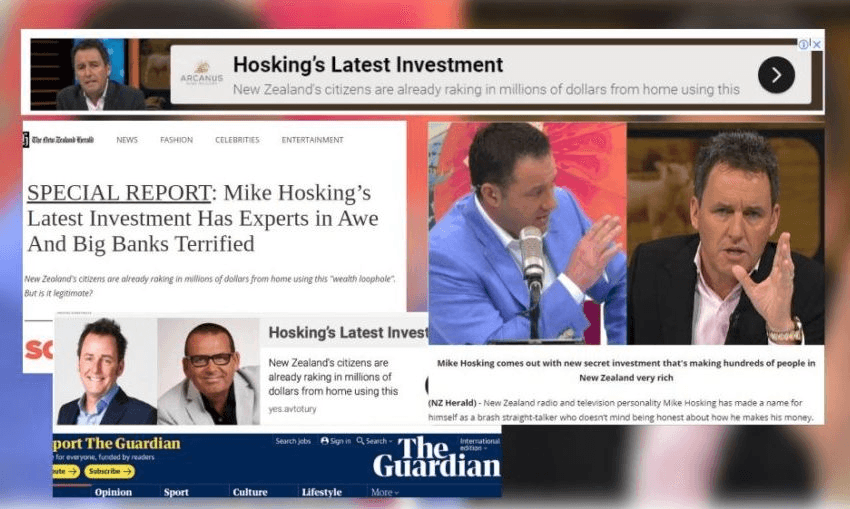First the broadcaster was caught up in an online swindle using Facebook – now it’s surfaced via the other media giant, with an ad that sends you to a fake NZ Herald site. The Herald says it’s seeing an ‘exponential growth in fake and fraudulent content’.
“Hosking’s Latest Investment”, went the headline on the Google-served advertisement, complete with a photograph of the award-winning broadcaster, placed on a New Zealand news site. “New Zealand’s citizens are already raking in millions of dollars from home …”
Click through – who could resist? – and you find yourself at the New Zealand Herald. Or, rather, a slapped-together sham Herald. “SPECIAL REPORT: Mike Hosking’s Latest Investment Has Experts in Awe And Big Banks Terrified.”
It goes on to promote a Bitcoin scam, falsely claiming the endorsement of Richard Branson, Elon Musk and Bill Gates.
The story fabricates quotes in which Hosking promotes an investment platform “that’s helping regular people in New Zealand build fortunes overnight” and provided him with “the biggest and easiest money I’ve ever made”.
According to the story, Hosking revealed his investment epiphany, a “wealth loophole” worth millions, during an interview with, of all things, a rival breakfast programme. “The AM Show co-host Duncan Garner was left in disbelief as Mike Hosking pulled out his phone and showed viewers how much money he’s making through this new money-making program that now has everyone in New Zealand whispering.”
In the fabricated story, Hosking is said to have urged viewers to dive in “before the banks shut it down”. Believe it or not, “minutes after the interview was over, ASB called to stop Hosking’s interview from being aired”. Which is a huge challenge for a live-to-air broadcast, but there you have it.
The bogus story uses precisely the same wording as an earlier version featuring New Zealand billionaire Graeme Hart, but with Hart’s name swapped out for Hosking’s.
Similar scams have been promoted recently on Facebook, with paid posts appropriating the image of Hosking as well as a range of other public figures including Hayley Holt, Richie McCaw, John Key and Jacinda Ardern. While the advertising platform has in the past been Facebook, however, the new Hosking scam was promoted via the other online global internet behemoth, Google, which automatically serves ads to participating sites. In this case the ad was served by Google via the New Zealand politics news site, Politik, last week. On Friday Google said the account that placed it had been detected, and the ad removed.
However, another version, featuring Paul Henry rather than Duncan Garner, was viewed by a reader in a prominent spot on the Guardian website this morning.
Late last year celebrity chef Annabel Langbein was reported to be considering legal action against Facebook and Google following a flurry of ads using her likeness in attempted scams.
A spokesperson for NZME, which owns both the Herald and Newstalk ZB, said the company had detected an “exponential growth in fake and fraudulent content including ads, pages, profiles, etc, on media sites”.
She added: “This is an issue targeting not just us, but media outlets and high profile media personalities in general. The moderation of these fake ads is initially the responsibility of the relevant ad network as they place the ads programmatically.
“The trust readers put in our content is a priority, so as a company we are investing time and money to remove fake content and reduce the frequency of such issues.”
Approached for comment, Hosking directed The Spinoff to his earlier remarks about the Facebook hosted ads.
Then he told listeners: “It’s not just about me. This is a broader thing … What these scumbags do is they target so-called well-known people and they link their name and their pictures to ads and things.”
He had been surprised to learn that a number of reasonable people had been suckered by the ads, despite the fact that they seemed to many so “obviously fraudulent”.
Hosking was especially appalled by the company’s reactive approach.
“The only way to get them down is by reporting them … which is such a stupid, pathetic excuse,” Hosking said.
“It’s like me on this show, playing any old ad I want, saying literally anything, legal or illegal, whatever you like, and then saying, look, the only way you can get those ads off the programme is if you ring us up and let us know. Because that’s the way we run things.”
He added: “Facebook’s standard line is that we don’t want fake ads on our platform. They may not want them, but they take them. They take the money and run them. And they will keep running them until you ring up and complain.”
Facebook subsequently said it had removed all the Hosking-related ads.
Google declined to answer specific questions about the emergence of fake ads co-opting identities, but said that its own systems had detected the sham Hosking ad and removed it.
“We have strict policies that govern the kinds of ads we allow on our platform, and ads that intend to mislead or deceive users are a violation of those policies. When we find ads that violate our policies, we remove them,” said a spokesperson in a statement.
The risks of misinformation and disinformation take on an extra significance with an election less than seven months away. Last week the Ministry of Health warned of a fabricated story on a bogus news site that was spreading misinformation about the coronavirus.




